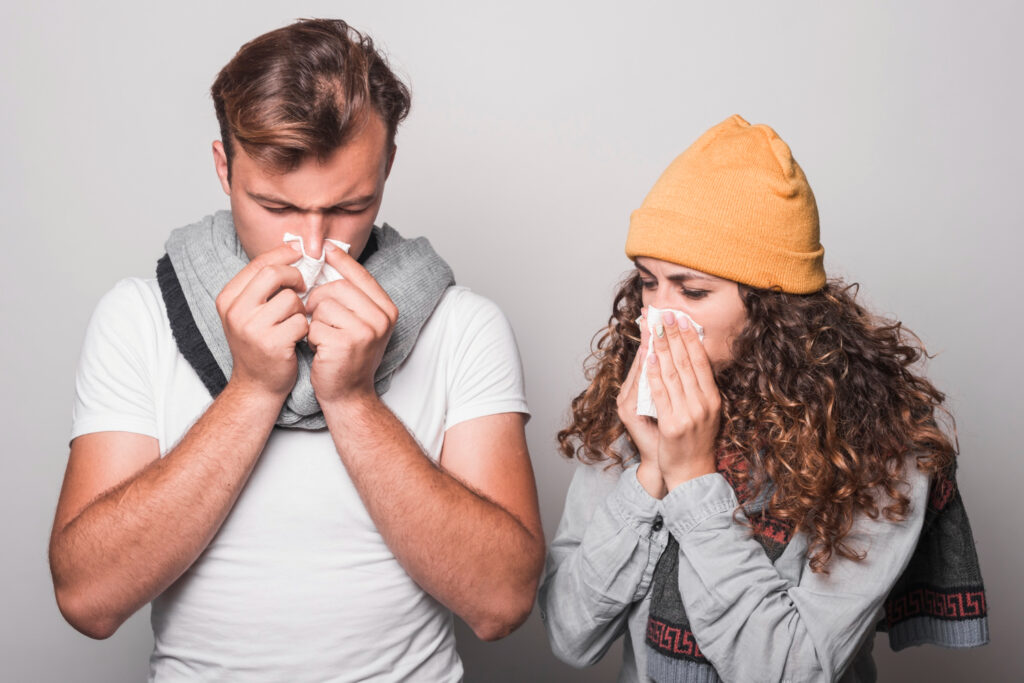
In this article
A cold sore in the nose typically starts with a burning sensation and develops into blisters that eventually ooze pus. Treatments, including ointments and home remedies, can help reduce symptoms.
Cold sores are caused by the herpes simplex virus (HSV), a contagious virus that spreads through close physical contact, such as kissing. Although there is no cure for herpes, certain medications can help manage pain and prevent future outbreaks.
Symptoms of a Nasal Cold Sore
Nasal cold sores develop in five stages, similar to oral cold sores:
- Tingling: A tingling or burning sensation begins in and around the nose or lips.
- Blistering: Fluid-filled blisters appear in or on the nose, usually in clusters.
- Weeping: The blisters burst and ooze, resulting in painful sores.
- Crusting: The sores dry out and itchy scabs form.
- Healing: The scabs fall off, and the skin heals.
During an outbreak, you might also experience flu-like symptoms, such as fever, muscle aches, and swollen lymph nodes. Typically, cold sores heal on their own within 1–2 weeks. If you develop eye symptoms during an outbreak, seek medical attention immediately, as herpes affecting the eyes can lead to permanent vision loss if not treated promptly.
Causes of Nasal Cold Sores
Cold sores are caused by the herpes simplex virus. There are two types of this virus:
- HSV-1: Usually causes cold sores.
- HSV-2: Usually causes genital herpes.
However, HSV-1 can affect the genitals, and HSV-2 can affect the face and mouth. Cold sores are contagious even when not visible and can be spread through close contact, such as kissing, sharing utensils, sharing cosmetics, or having oral sex.
Although HSV cannot be cured, the virus remains in the body even without symptoms, leading to potential future outbreaks. These can be triggered by a compromised immune system, illness, or stress.
Risk Factors for Developing Nasal Cold Sores
Anyone with HSV can develop nasal cold sores. Herpes is common, with 67% of the world’s population under 50 having HSV-1 according to 2016 data from the World Health Organization. Not everyone with HSV-1 experiences symptoms, and some may have frequent outbreaks. Factors that can trigger symptoms include illness, stress, a weakened immune system, menstruation, chemotherapy, and pregnancy.
Diagnosing Nasal Cold Sores
Healthcare professionals can diagnose nasal cold sores through a visual examination. In some cases, they may test fluid from the sore for HSV, although visual identification is usually sufficient.
Treatment Options for Nasal Cold Sores
While there is no cure for herpes, treatments can reduce discomfort and manage symptoms.
Prescription Treatments:
Healthcare practitioners can prescribe antiviral medications such as:
- Acyclovir (Zovirax)
- Famciclovir (Famvir)
- Valacyclovir (Valtrex)
These medications help reduce the risk of transmission and can suppress the virus, lowering the chance of future outbreaks.
Over-the-Counter Treatments:
Docosanol (Abreva) is a topical treatment available over the counter. It reduces the spread of the virus into healthy cells and is most effective when applied at the early tingling stage. Use a cotton bud or pad to apply the medication to prevent spreading the virus to other areas.
OTC pain relievers like acetaminophen (Tylenol) and ibuprofen (Advil) can also help alleviate pain.
Home Remedies:
Home treatments can soothe symptoms, including:
- Cold or warm compresses held over the nose.
- Zinc oxide ointment during the crusting or healing stages.
- Sunscreen on cold sores exposed to sunlight.
Research suggests that topicals containing propolis may soothe cold sores and promote healing, witch hazel can dry out and heal cold sores (though it may sting), and aloe vera can soothe irritation and pain.
Always wash your hands before touching other parts of your face after applying treatments, preferably using a cotton bud or pad to avoid spreading the virus.
Summary
While cold sores usually appear around the mouth, they can also occur in or around the nose. Despite being painful, over-the-counter and prescription medications can alleviate discomfort. Home remedies may also offer relief
A Quick Review
Nasal cold sores, caused by the herpes simplex virus, begin with a burning sensation and develop into blisters. They are contagious and can be treated with antiviral medications, over-the-counter remedies, and home treatments to manage symptoms and reduce discomfort
FAQS
What causes nasal cold sores?
Nasal cold sores are caused by the herpes simplex virus (HSV), typically HSV-1. This virus spreads through close physical contact, such as kissing or sharing personal items.
What are the symptoms of a nasal cold sore?
Symptoms include a tingling or burning sensation, fluid-filled blisters, painful sores after the blisters burst, crusting of the sores, and eventual healing. Flu-like symptoms such as fever, muscle aches, and swollen lymph nodes may also occur.
How are nasal cold sores diagnosed?
healthcare professional can usually diagnose nasal cold sores through a visual examination. In some cases, a fluid sample from the sore may be tested for HSV.
Can nasal cold sores be cured?
There is no cure for herpes simplex virus infections. However, treatments are available to manage symptoms and reduce the frequency of outbreaks.











